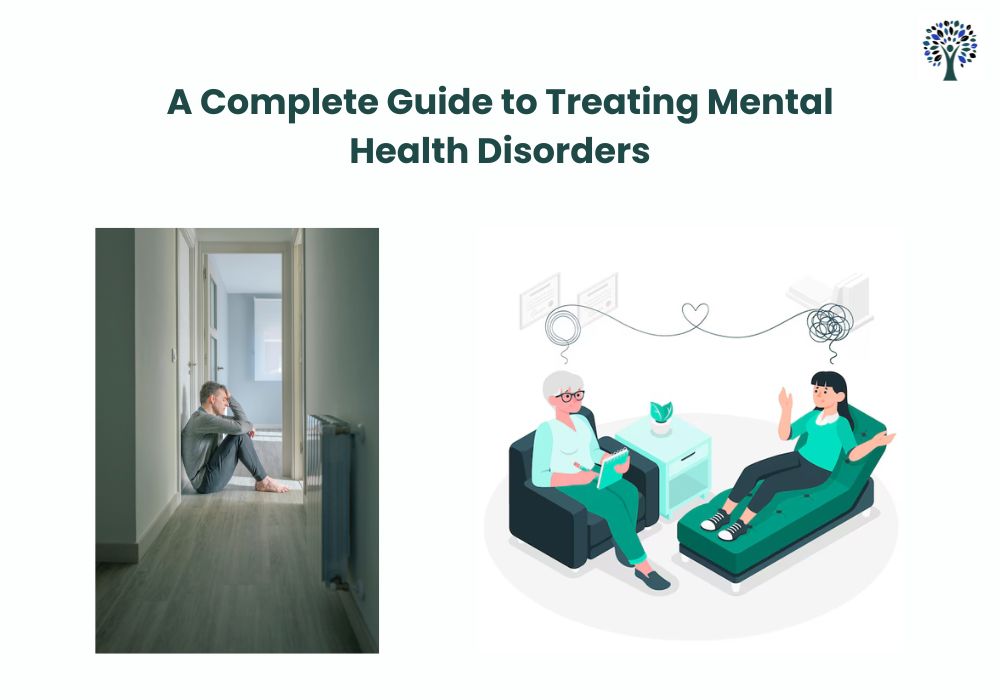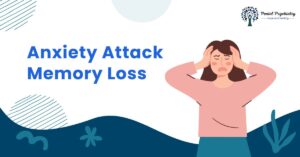Mental health problems affect people all over the world. Millions face them every year. These problems include anxiety, depression, bipolar disorder, and OCD. Each one can change how a person feels, thinks, and lives.
At Peniel Psychiatry, we know how important it is to understand mental health. Learning the signs and knowing the care options is the first step to feeling better. In this simple guide, we will talk about the most common mental health problems. We will also share their symptoms and ways people can get help. The goal is to help you or someone you love take back control.
Understanding Mental Health Disorders
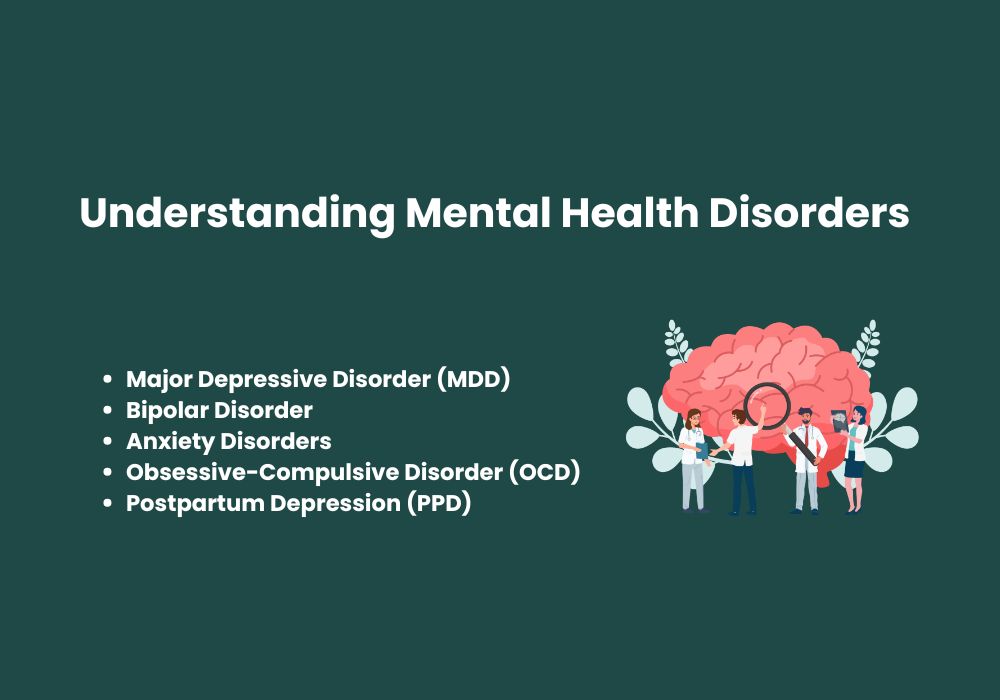
Mental health disorders are conditions that affect mood, thinking, and behavior. They can cause serious distress. They can also harm work, relationships, and daily life.
Some of the most common mental health disorders are:
Major Depressive Disorder (MDD): Ongoing sadness, hopelessness, and loss of interest in daily activities.
Bipolar Disorder: Strong mood swings. These include deep depression and high-energy states called mania or hypomania.
Anxiety Disorders: These include generalized anxiety disorder (GAD), panic disorder, and social anxiety disorder. All involve intense worry or fear.
Obsessive-Compulsive Disorder (OCD): Repeated, unwanted thoughts (obsessions) and repeated actions (compulsions) done to ease anxiety.
Postpartum Depression (PPD): Depression after childbirth. It can bring sadness, tiredness, and irritability.
Each disorder has its own symptoms and challenges. But all can be treated. Knowing the symptoms is the first step to getting help..
Symptoms of Mental Health Disorders
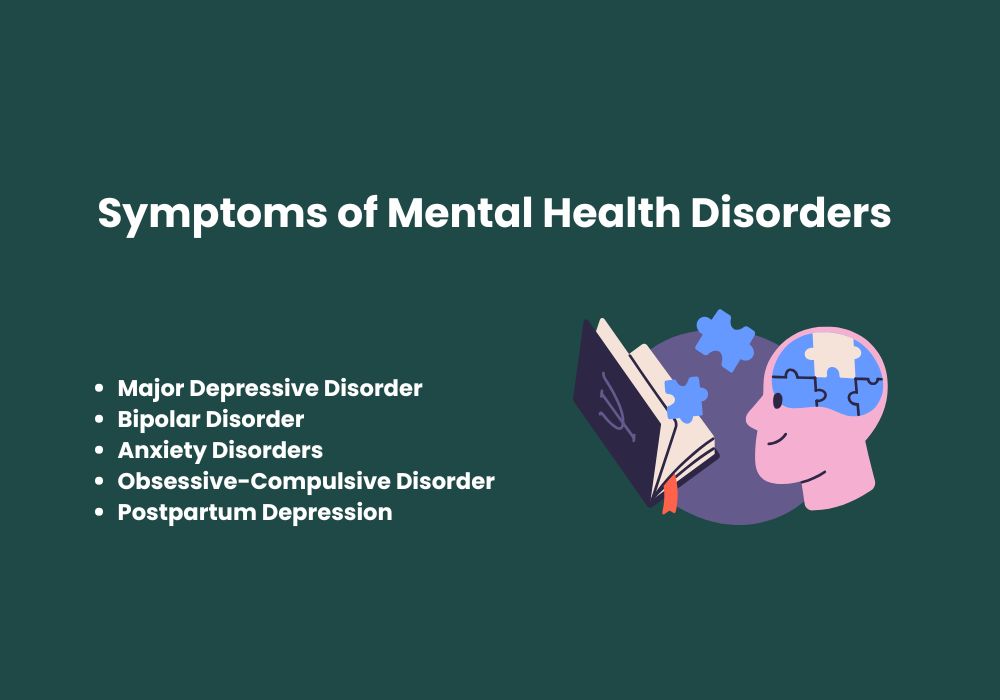
Identifying the symptoms of mental health disorders is crucial for early intervention. Some common symptoms to watch out for include:
- Major Depressive Disorder: Symptoms include persistent sadness, lack of motivation, feelings of worthlessness, difficulty concentrating, changes in appetite or sleep patterns, and thoughts of self-harm or suicide.
- Bipolar Disorder: Symptoms include dramatic mood shifts, including periods of intense energy, impulsive behavior, and irritability (mania), followed by feelings of sadness, hopelessness, and fatigue (depression).
- Anxiety Disorders: Common symptoms include excessive worry, difficulty relaxing, restlessness, racing thoughts, increased heart rate, and trouble sleeping.
- Obsessive-Compulsive Disorder: Individuals with OCD may experience recurring, intrusive thoughts (obsessions) and engage in repetitive behaviors (compulsions) to reduce anxiety, such as washing hands or checking locks multiple times.
- Postpartum Depression: Symptoms of PPD may include extreme sadness, feelings of isolation, trouble bonding with the baby, irritability, and changes in appetite or sleep patterns.
Recognizing these symptoms early can lead to better treatment outcomes. It’s essential to seek professional help when symptoms become overwhelming or interfere with daily life.
Treatment Options for Mental Health Disorders
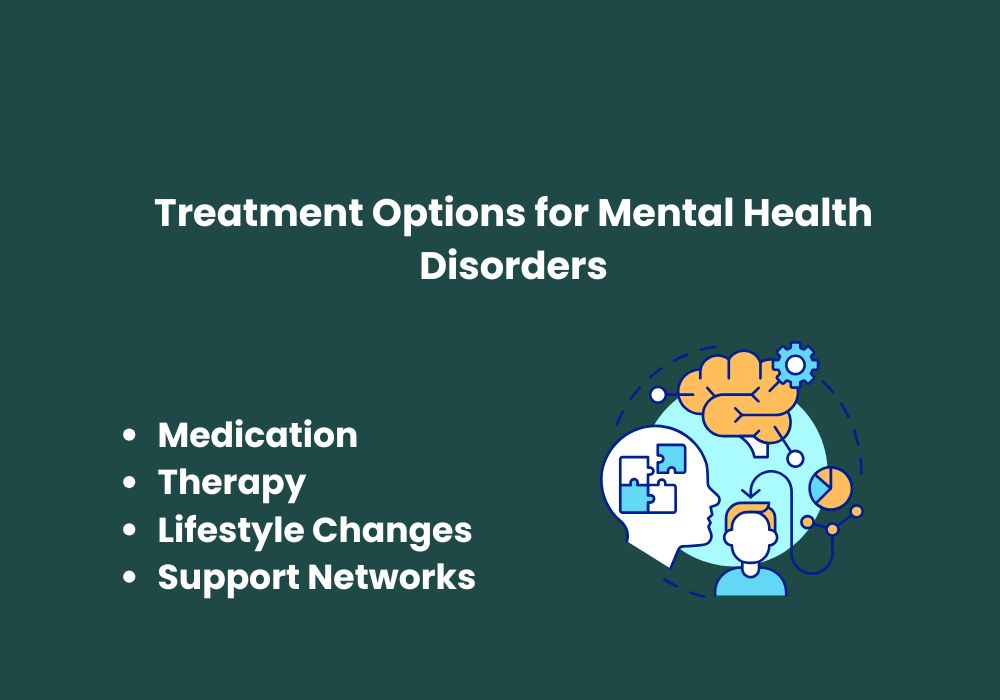
There is no single way to treat mental health problems. What works for one person might not work for another. The best plan depends on the type and level of the condition. Each treatment is made to fit the person. Below are some common ways to treat mental health issues:
1. Medication
Medicine is often a key part of treatment. It can be very helpful for depression, anxiety, or bipolar disorder. These drugs help the brain balance mood and behavior. Some types of medicine are often used include
- Antidepressants for depression and anxiety disorders.
- Mood stabilizers for bipolar disorder.
- Anti-anxiety medications to help manage symptoms of anxiety.
- Selective serotonin reuptake inhibitors (SSRIs) and serotonin-norepinephrine reuptake inhibitors (SNRIs) are commonly used to treat depression and anxiety.
While medications can be highly effective, it’s essential to work closely with a psychiatrist to find the right medication and dosage. It may take time to find the best fit, as some medicines can have side effects.
2. Therapy (Psychotherapy)
Psychotherapy, or talk therapy, is a common treatment for many mental health problems. It means talking with a trained therapist. The goal is to work through feelings, thoughts, and actions that cause stress or illness. Here are some common types of therapy:
- Cognitive Behavioral Therapy (CBT): CBT helps individuals identify and modify harmful thoughts and behaviors. It works well for anxiety, depression, and OCD.
- Dialectical Behavior Therapy (DBT): DBT helps individuals manage intense emotions and behaviors. It is often used for bipolar and borderline personality disorders.
- Exposure Therapy: This is for anxiety and OCD. It helps people face fears slowly, so the fear becomes smaller.
- Interpersonal Therapy (IPT): IPT helps individuals improve their relationships and communication skills with others. It is often used to treat depression.
Therapy is a valuable tool for addressing underlying emotional issues, learning coping strategies, and developing healthier thought patterns.
3. Lifestyle Changes and Self-Care
In addition to professional treatment, lifestyle changes can play a crucial role in managing mental health disorders. Engaging in regular physical activity, practicing mindfulness, getting adequate sleep, and maintaining a balanced diet can all help support mental health.
- Exercise: Regular physical activity can boost mood by increasing serotonin levels in the brain.
- Mindfulness and Meditation: These practices can help reduce stress, promote relaxation, and aid in managing anxiety and depression.
- Sleep Hygiene: Maintaining a consistent sleep schedule and creating a relaxing bedtime routine can improve mood and reduce irritability.
4. Support Networks
Having a strong support system is essential for managing mental health. This can include family, friends, support groups, or online communities. Talking about mental health challenges with others who understand can provide comfort, reduce feelings of isolation, and encourage healing.
Getting Help: Seeking Professional Treatment
If you or someone you love is struggling with mental health, it is essential to get help. At Peniel Psychiatry, we give kind and personal care. We help people with many types of mental health problems. Our team includes skilled psychiatrists, therapists, and counselors. They guide you through each step of your care. We offer medical help, talk therapy, and ongoing support.
Frequently Asked Questions (FAQS)
What are the most common types of mental health disorders?
Common mental health disorders include depression, anxiety disorders, bipolar disorder, OCD, and postpartum depression.
How can I tell if I or someone else might have a mental health disorder?
Signs include persistent sadness, extreme mood swings, excessive worry, intrusive thoughts, and changes in sleep, appetite, or behavior.
What treatment options are available for mental health disorders?
Treatment may include medication, various forms of psychotherapy (like CBT or DBT), lifestyle changes, and support systems.
Can mental health disorders be cured completely?
While many mental health conditions can’t be “cured” permanently, they can be effectively managed with ongoing treatment and support.
When should I seek help from a mental health professional?
If symptoms start to interfere with daily life, relationships, or cause significant distress, it’s essential to consult a licensed psychiatrist or therapist.
Conclusion
Treating mental health disorders is an ongoing process that involves a combination of therapy, medication, lifestyle changes, and support. With the right approach and professional guidance, recovery is possible and achievable. If you’re ready to take the next step in managing your mental health, reach out to Peniel Psychiatry today. We are committed to providing the care you need to live a fulfilling and healthy life.

